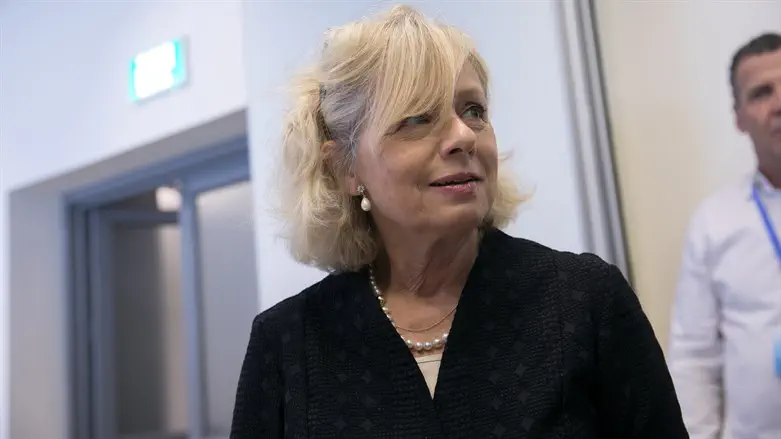
Attorney Zehava Gur has filed a petition with the Supreme Court demanding a formal investigation into the incident involving the alleged theft of a ceramic vest by the son of Attorney General Gali Baharav-Miara, as well as other related suspicions surrounding the case.
In an interview with Arutz Sheva-Israel National News, Gur elaborated on the petition and its significance: "This is a petition that should never have had to reach the High Court. We're dealing with a serious incident—documented theft of a ceramic vest by the Attorney General’s son—yet the public was kept in the dark. There was silence around the affair for a full year until it was exposed by Channel 14."
“What is truly disturbing, beyond the selective enforcement and the fact that the suspect was never questioned, is the collaboration between military and civilian entities to cover up such a serious case. It is deeply troubling,” Gur stated, revealing that she submitted a complaint to Israel Police on January 1, 2025, only to have it closed the very next day.
According to Gur, police claimed no criminal offense had occurred and that the matter would be transferred to the Military Police (MPCID). However, repeated inquiries revealed that the complaint never reached MPCID and no investigation file was ever opened. “This surreal situation clearly requires an independent investigation—without waiting for instructions from the High Court,” she said.
Gur also addressed the apparent connection between the Military Advocate General and the Attorney General, raising concerns of a potential conflict of interest. "This touches on issues of public integrity. The Movement for Governability and Democracy, along with myself, submitted a complaint against the Military Advocate General over an incident suggesting ethical misconduct,” she noted, referring to the latter’s participation in a private family event of a Channel 12 figure. That complaint, submitted to the Attorney General, remains unaddressed.
At the same time, Gur questioned why the Military Advocate General has not launched an investigation into the Attorney General’s son—something that, by all accounts, should have happened long ago.
Her implication: a potential quid pro quo arrangement between the two officials. The Attorney General does not pursue the event involving the Military Advocate General, and in return, the latter refrains from investigating the Attorney General’s son. “Of course, all this is alleged,” Gur clarified. “We don’t know the exact considerations, but it certainly raises serious concerns. This is why a full investigation is necessary—to bring clarity and truth to the public. If this had been any other soldier, the law would have been applied, and he would likely be in prison.”
Gur also reviewed previous court rulings and noted, “Even stealing a fellow soldier’s phone is clearly defined as ‘theft from a soldier’ and has resulted in demotions, prison sentences, and compensation payments. Here, we’re talking about a vest containing ammunition and military equipment.”
She further pointed out that the current whereabouts of the vest remain unknown. “No one can say where it is,” she said, referencing a recorded conversation between the Attorney General’s son, Omer, and the soldier to whom the vest belonged. In the conversation, Omer admitted to the theft and offered to purchase a similar vest—never promising to return the original. “One version he gave was that he threw it by the roadside after leaving the base. All of this needs to be thoroughly investigated.”
Addressing the alleged cover-up, Gur cautiously suggested that the Attorney General must have been aware and involved. “It’s inconceivable that she remained unaware of the matter for a year and a half, yet never said a word about it.”
Several reserve soldiers have also joined the petition, asserting that had one of them been implicated in such conduct—or even in a lesser offense—they would have already faced an MPCID investigation. Gur said many more soldiers back the concerns raised, even if not formally party to the petition. “These are men who put their lives on the line in repeated reserve duty and feel discriminated against. Selective enforcement is a crime.”
Asked whether her petition will merely gather dust in the High Court’s files, Gur admitted, “We have no expectations. Sadly, the Supreme Court no longer fulfills its intended role. When you approach the High Court already knowing the outcome, that should worry anyone who respects the rule of law. It’s an absurd and troubling reality.”
Still, she concluded, “We have no other means to bring these matters to light, so we turn to the High Court. But if I had another option, I would not go to the Supreme Court under these circumstances.”